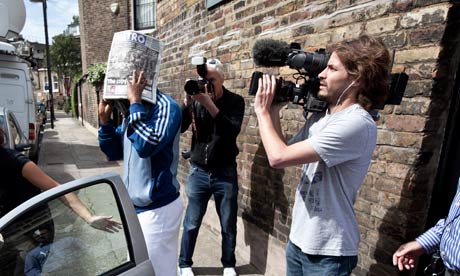England riots: all-night courts praised, but were they a publicity stunt?
We need help from those involved in dealing with riot cases who are willing to be interviewed for phase two of the Reading the Riots research
Highbury magistrates court, which was visited by the director of public prosecutions, Keir Starmer, during an all-night sitting to deal with rioting. Photograph: Felix Clay
The director of public prosecutions, Keir Starmer, made a morale-boosting visit to Highbury magistrates court, north London, at about 4am during one of its night sittings at the height of the August riots, and later praised the efficient response to the disorder.
In the appeal court judgment on riot sentences (which generally upheld the lower courts' ruling), the lord chief justice praised the "committed and dedicated" way in which courts rose to the challenge of the riots – and singled out those which had sat through the night.
Rather than finding efficiency under pressure, he would have witnessed near chaos and conditions verging on the unsanitary, as prisoners were crammed three to a cell with no toilet facilities.
"The CPS was totally disorganised. I saw an argument between two prosecutors who were working over night at one point," says the solicitor.
"Things weren't much better in the courts, defendants were remanded in custody on the basis of no evidence, with the judges rubber stamping prosecution applications and all but ignoring the safeguards of the Bail Act", he adds.
Malcolm Fowler, who practises in Birmingham, says his local magistrates court is generally so under worked it could have accommodated the riot cases in regular sessions.
"By mid-morning on most days, you would expect to see tumbleweed drifting down the court corridors; so bereft of work is the judiciary. For once the courts might have been operating at something approaching their full capacity."
The initial response of the courts and police to the riots can be characterised as "chaos on stilts", he adds.
Young said chaos reigned at a City of Westminster magistrates court all night sitting from midnight until 6.30am.
It was all but impossible for defence solicitors to counter CPS objections to bail, such as by providing approved bail addresses.
The response of the courts was not robust efficiency, but one of "blind panic" from the judges and prosecutors, says Young.
Since the riots, most comment on the criminal justice system's response has focused on the level of sentencing, with some critics – including prosecutors — concerned that defendants who played a minor role were given disproportionately harsh sentences.
Fowler says: "Unless we remain vigilant, all the bad features of riot case process and courts will be foisted upon us as a desirable template, with rule of law and due process concerns swept aside as so much tedious sophistry."
The next phase of the Guardian/LSE's Reading the Riots research aims to unravel how the criminal justice system responded and what lessons can be learned.
The research will include in depth interviews with those at the sharp end of its response. There will also be a series of "town hall-style" meetings with the communities worst affected by the worst bout of civil unrest for a generation.
Phase one of the research has prompted a national review of the way police use stop and search, after findings that anger at the police was a significant factor in fuelling the disorder.
Speaking at the Guardian/LSE Reading the Riots conference, the home secretary Theresa May said: "I strongly believe that stop and search should be used proportionately, without prejudice, and with the support of local communities … and I have asked the Association of Chief Police Officers to look at best practice on stop and search."
The Reading the Riots team would like to hear from those in the criminal justice system who had substantial involvement in dealing with riot cases and are willing to take part in a confidential research interview.
http://www.guardian.co.uk/law/2011/dec/22/england-riots-all-night-courts?newsfeed=true

